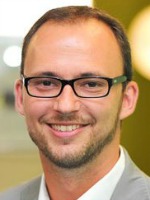 Roche Venture Fund has contributed to a big day for another Spanish biotech. Minoryx Therapeutics is the latest of the country's biotechs to cash in, raising €19.4 million ($21.7 million) in a round led by Ysios Capital and supported by Roche's ($RHHBY) VC unit to move its treatment for a rare neurodegenerative disease into clinical trials.
Roche Venture Fund has contributed to a big day for another Spanish biotech. Minoryx Therapeutics is the latest of the country's biotechs to cash in, raising €19.4 million ($21.7 million) in a round led by Ysios Capital and supported by Roche's ($RHHBY) VC unit to move its treatment for a rare neurodegenerative disease into clinical trials.
 |
| Minoryx CEO Marc Martinell |
Barcelona, Spain-based Minoryx plans to start a Phase I trial of its lead candidate, a treatment for the genetic disorder X‐linked adrenoleukodystrophy (X-ALD), early next year. The drug, MIN-102, is a PPAR-gamma agonist, a class of products whose potential in neurodegenerative disorders Minoryx CEO Marc Martinell sees as being backed up by a wealth of research. Martinell thinks MIN-102 is the drug to start unlocking this potential. "The problem is to have the right candidate for CNS-related indications. That's what we think we have," Martinell told FierceBiotech.
X-ALD arises because of mutations in the ABCD1 gene that encodes for membrane proteins known as peroxisomal ABC transporters. Yet while X-ALD has a clear genetic root, the symptoms it causes vary from patient to patient. The cerebral form of X-ALD, which primarily manifests in the first 10 years of life, is associated with demyelination that leads to early death. The more common form causes the progressive deterioration of motor function in adults. Martinell thinks MIN-102 can address both forms, a view that to date is backed up mainly by data from animal models.
Minoryx now has the cash to test its hypothesis in the clinic. The €19.4 million is expected to give the Catalan biotech enough money to take MIN-102 to clinical validation. This may take some time, though. "ALD is a disease that is difficult and the trials are relatively long," Martinell said. While the clinical team, which Minoryx plans to bolster using the venture funding, is working on the trials of MIN-102, the research unit will spend its time investigating the next generation of products to come down the pipeline.
Martinell and his colleagues are taking a different approach to these early-stage programs. While MIN-102 is trying to treat the symptoms of X-ALD, the research-stage focus is on addressing the core causes of other diseases. Specifically, the technology platform on which the research program is based is designed to identify pharmacological chaperones that can stop symptoms from developing. "The goal of this platform is to develop compounds that stabilize the proteins that are affected by missense mutations. Because of these mutations the proteins are degraded," Martinell said.
Amicus Therapeutics ($FOLD) is pursuing a similar idea in the U.S., but Martinell thinks Minoryx's platform has an advantage. "When chaperons were initially developed, analogues of the natural substrate [were used]. These small molecules bind to the active site to stabilize the protein, but also compete with the natural substrate, which complicates the whole development," he said. Minoryx's platform identifies alternative binding locations, eliminating the competition concerns and freeing it from the need to copy the design of the natural substrate.
"Because we are not restricted to having compounds similar to the natural substrate, our's are much more drug like compounds," Martinell said. Such statements are leant credence by the backgrounds of the team Martinell is working with at Minoryx. Martinell and fellow co-founder Joan Aymamí both worked at Crystax Pharmaceuticals prior to its acquisition by Oryzon Genomics, the Spanish biotech that is partnered with Roche and planning to go public in Madrid. The emergence of leaders with experience of building and selling biotechs is one of several encouraging signs for biotech in Spain.
The Series A round is another indication of the role Ysios Capital is playing in nurturing the Spanish biotech ecosystem--and the availability of local companies it thinks are worth investing in. Ysios runs out of offices in the Spanish cities of Barcelona and San Sebastian but has always been willing to look beyond its borders for investments. Now, the Spanish core of its portfolio is growing. Ysios led Minoryx's round and last month's €36.6 million investment in Sanifit, putting it at the center of two of the biggest VC financings in the history of biotech in Spain.
- read the release